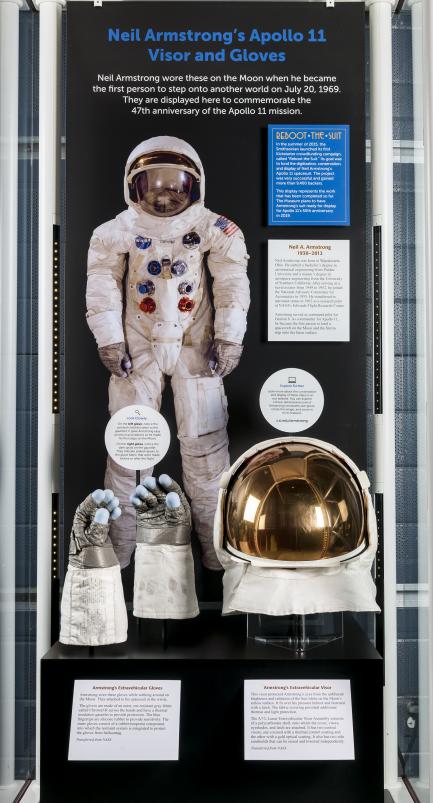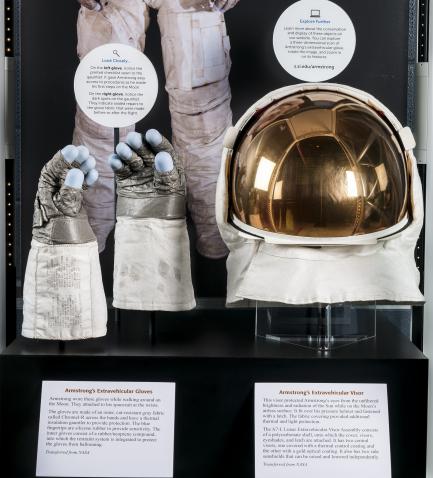View of exhibit "Neil Armstrong's Apollo 11 Visor and Gloves," featuring flown Apollo A-7L spacesuit extravehicular visor and gloves in the James S. McDonnell Space Hangar at the National Air and Space Museum's Udvar-Hazy Center, Chantilly, Va.
Neil Armstrong’s Apollo 11 Gloves and Helmet Go on Display at Smithsonian’s National Air and Space Museum
In commemoration of the 47th anniversary of the first moon landing, the National Air and Space Museum will display Neil Armstrong’s lunar extravehicular gloves and helmet for the first time since 2012. The artifacts recently underwent conservation as part of the successful “Reboot the Suit” Kickstarter campaign conducted in summer 2015. They will be on view for one year, beginning July 20, at the museum’s Steven F. Udvar-Hazy Center in Chantilly, Va.
“The opportunity to display these artifacts is rare because of their fragility and the necessity to maintain a controlled environment,” said Cathleen Lewis, curator of space history at the museum. “We are excited for the opportunity to show our visitors these components while we work to conserve the body of Neil’s suit.”
The gloves and helmet have been to the surface of the moon, have traveled the world and are symbols of the accomplishments and achievements of mankind. Their beautifully crafted and engineered design allowed Neil Armstrong to live, work and survive on another world. The conservation and display of Armstrong’s suit are made possible through a Kickstarter campaign, “Reboot the Suit,” that launched July 20, 2015. The initial campaign goal of $500,000 to conserve, digitize and display the suit was achieved in just five days.
Armstrong’s complete Apollo 11 spacesuit will go on display in time for the 50th anniversary of the moon landing in 2019. As part of the conservation and archival efforts, the museum is asking the public for photos of the spacesuit on display during its national tour beginning in 1970, the gloves and helmet on later tours and the spacesuit on display at the Smithsonian between 1971 and 2006. Conservators and curators will use the primary-source photos as reference materials for the project. To submit photos or find out more, contact the museum at ArmstrongSuit@si.edu.
The Smithsonian will also make available a high resolution 3-D scan of the Apollo 11 command module Columbia, as part of the anniversary commemoration. This highly detailed model, available at 3d.si.edu, allows anyone with an Internet connection to explore the entire craft including its intricate interior, a feat not possible when viewing the artifact in the museum.
The National Air and Space Museum building on the National Mall in Washington, D.C., is located at Sixth Street and Independence Avenue S.W. The museum’s Steven F. Udvar-Hazy Center is located in Chantilly, Va., near Washington Dulles International Airport. Both facilities are open daily from 10 a.m. until 5:30 p.m. (closed Dec. 25). Admission is free, but there is a $15 fee for parking at the Udvar-Hazy Center.
# # #
SI-373-2016
Alison Wood
202-633-2376



